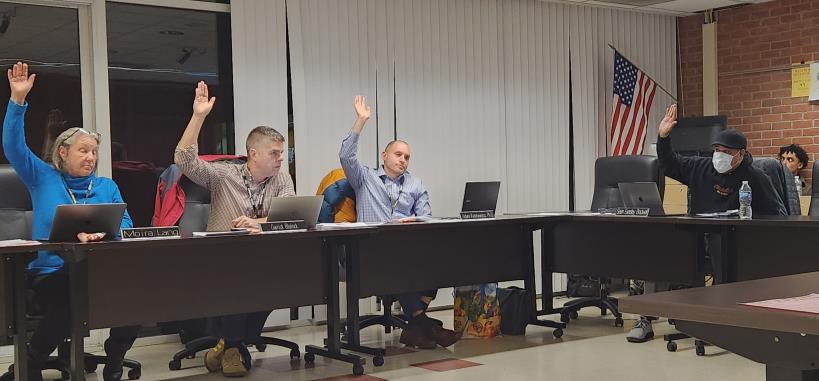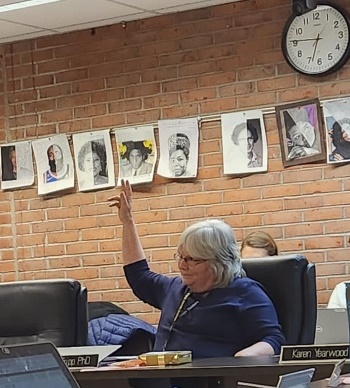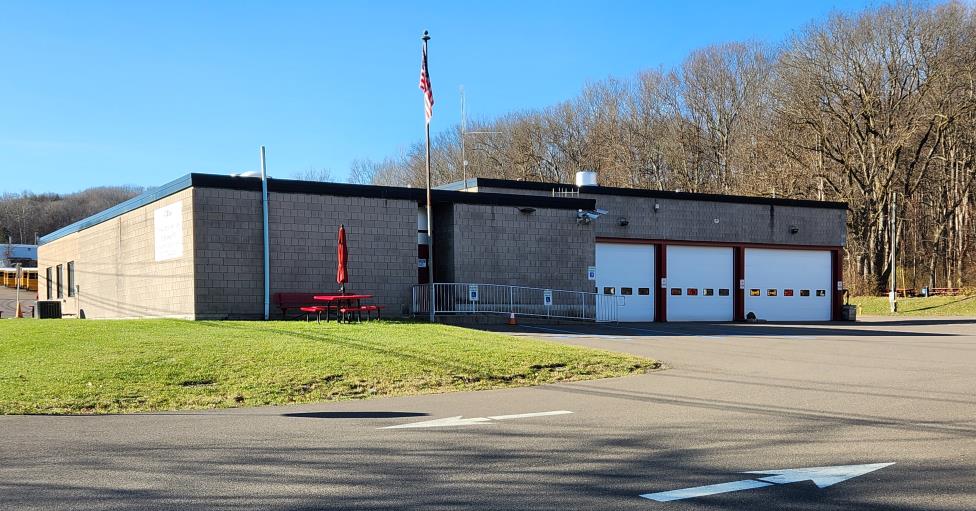ICSD Board picks $125M Capital Option
by Robert Lynch, December 20, 2023

Arguably, it deserved more discussion than it got. Just 15 minutes after bringing the matter to the floor, the Ithaca City School District (ICSD) Board of Education adopted a Resolution Tuesday that will ask voters next May to authorize the highest capital spending endeavor in recent memory, $125 Million.
By voting as they did, Board members declined to consider a pair of less-costly alternative packages before them; capital requests of $40 Million and $98 Million, respectively.
Each of the three options, part of what the ICSD calls a “District-Wide Capital Improvement Project,” would replace the School District’s more than half-century old Transportation Facility on Bostwick Road. Each would also upgrade the facilities’ complex for an expected fleet of electric buses. The transportation component alone would eat up $40 Million of each package’s total cost.
“We’re going to borrow it in stages,” School Board Vice-Chair Maura Lang advised anyone who might have been listening during her Board’s abbreviated discussion of the spending package Tuesday. This enables us to have “a credit line from the public,” she explained.
Of course, that kind of explanation could prompt many a cost-conscious Ithaca taxpayer to wince. Aside from the new bus garage and its electrification, none of the remaining $85 Million in proposed capital spending has been identified in any detail. A pie chart presented the Board at a mid-November committee session identified roofs, bathrooms, cafeterias and parking lots in need of fix-up, but only in the most general of terms. Beyond the bus garage, there’s a “trust-us” message that one senses pervades the academic atmosphere and guides what the Board is sending its voters.
“This enables us to be flexible in circumstances,” Lange stated at Tuesday’s meeting.
“Each payment will come back to the Board,” President Dr. Sean Eversley Bradwell assured any skeptical constituent who might be listening in the vast expanse that lies beyond the board room. And of the $125 Million total, Dr. Bradwell said, “The Board is not required to spend it.”
But again, any cynic will push back. They’d ask, “When was the last time even one dollar released from the taxpayer’s faucet didn’t find its way down government’s drain?”
The bonding of each distinct construction project requires its own school board vote, a district official assured this writer after the meeting. Yet the public’s capacity to micro-manage its school system’s investments stands directly proportionate to the public’s willingness to engage.
Addressing that point, Tuesday’s meeting proved less than reassuring. At neither that meeting, nor at any of the four most recent School Board or committee sessions dealing with this issue has any resident spoken up about the capital package. No one has told the Board how much to spend, or how to spend it.
The only recent rival to what’s now being asked of voters is the $120 Million authorization approved by Ithaca voters in 2019. A tiny fraction of that earlier total still remains unspent today.
Tuesday’s Board of Education vote was 8-1. Only member Jill Tripp dissented. Based on her comments at past meetings, Tripp favors taking capital investments in smaller bites; with a series of lower-priced packages individually put to referendum over time. Tripp, like her colleagues, supports bus garage replacement. But she’d rather offer up packages of shorter duration; adding in a few million every few years to fix up what’s needed as reality dictates.

Tripp did not elaborate on her “No” vote during Tuesday’s session, and she left shortly after the meeting had adjourned. Her only memorable question before the vote occurred was to seek assurance that a $40 Million bond issue—the lowest of the alternatives potentially on the table—would have covered bus garage replacement. She was told that it would. She appeared satisfied.
At times Tuesday, some Board members sounded contrite. They tacitly acknowledged their haste. They were poised to dispatch a mammoth capital obligation out of the board room door and on to the polling booth with inordinate speed. They’d given only a quarter-hour’s talk-time to it.
“This has been discussed at multiple meetings,” Maura Lange assured everyone, almost apologetically. There’s been “abundant information.”
Yes, the District-Wide Capital Improvement Project has been discussed, but mostly by paid administrators and consultants. With a few notable exceptions—count top-figure supporters Eldred Harris and Karen Yearwood among them—most on the Board of Education have refrained individually from endorsing one distinct spending option over another with any specificity. Jill Tripp had done so. But she voted “No.”
Harris spoke again Tuesday in favor of the $125 Million preference. He attended the meeting remotely. He had audio problems. He needed to have his remarks shared to others via Lange.
“I want to simplify what we’re hearing,” Harris conveyed to the Board through Maura Lange. “If we go with 125 Million… we’re not taking money out of the General Fund budget; we’re borrowing it.”
And there lies the dirty little secret. It’s one that every resident of this state should know. New York makes it addictively enticing for school districts to borrow money for capital. Under the current formula, administrators advise us, for every dollar a district bonds for capital projects, Albany reimburses it 58 cents. Yet if a new roof gets built or a parking lot gets paved with General Fund cash, local taxpayers may eat every penny.
Should Ithaca School District voters ratify the $125 Million capital spending package next May, expect the Ithaca School District Transportation Facility, built in 1967, to be dealt a death blow. The building was constructed at a time when the District had 26 buses. It now has 88. And with New York State mandating all vehicles be electric-powered by 2035, the existing garage stands woefully undersized to handle the maintenance-intensive replacements.

“It’s in rough shape,” an Ithaca Schools’ facilities administrator described the garage after Tuesday’s meeting. He then partially walked back his words. Chief Operating Officer Amanda Verba told the Board November 28th that current thinking points toward knocking down the old garage and building anew, rather than expansion and renovation.
The more frugal $40 Million and $98 Million capital options never reached School Board consideration Tuesday. And perhaps that occurred by design. Board President Bradwell explained that as soon as one of the three choices had obtained a majority vote, parliamentary procedure demanded the other two be discarded as moot. Member Garrick Blalock quickly moved for the highest number in his packet. His motion then passed. The matter became settled.
One final point: The only person to address the Ithaca Board of Education Tuesday was a passionate environmental activist who urged the replacement of all disposable dishes and utensils in all Ithaca School cafeterias with reusables. But there’s a problem, she was told. Believe it or not, only four school campuses have dish washers these days, sanitation the Health Department demands for washable plates and spoons. So expect dish washers to make their way into the capital behemoth all of us Ithaca District voters will decide next spring. That, and maybe just about anything else.
###

